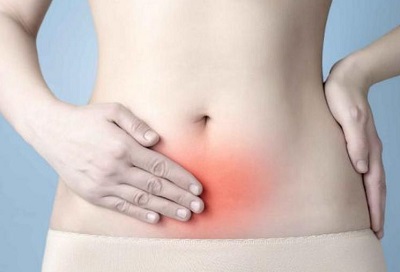Increasingly Severe Dysmenorrhea? It May Be a Warning from The Endometrium!
It is believed that many women have experienced dysmenorrhea, or painful menstruation, and are actively seeking various ways to relieve this unspeakable "pain." However, contrary to wishes, pain may get worse during menstruation. Many women believe dysmenorrhea is caused by eating raw or cold food or not keeping warm. However, the truth may not be so simple.

For women who experience dysmenorrhea every month, it could be a warning of endometrium in terms of a certain disease, but other reasons could also cause it.
Dysmenorrhea refers to spasmodic pain and distension in the lower abdomen, accompanied by lumbar acid or other general discomforts before and after or during menstruation. It can negatively affect daily life in severe cases. Commonly, dysmenorrhea is divided into primary dysmenorrhea and secondary dysmenorrhea. When a woman has dysmenorrhea, it is necessary to go to the hospital in time to check the cause. She had better follow the doctor's guidance and take a positive attitude during treatment.
After a detailed gynecological examination, such as a color ultrasound examination, if there are no apparent abnormalities in pelvic organs, it is primary dysmenorrhea, also known as functional dysmenorrhea. This accounts for more than 90% of all dysmenorrhea cases clinically. Most women with primary dysmenorrhea experience pain from the beginning of menarche, but the painful symptoms generally do not show progressive aggravation. At the same time, their menstrual volume and period tend to show no notable change.
Secondary dysmenorrhea refers to the situation in which there are apparent organic lesions in reproductive organs, such as endometriosis, pelvic inflammatory disease, tumor, etc. It is important to note that when women have secondary dysmenorrhea, they should be immediately alerted that they may have developed problems in the endometrium.
Dysmenorrhea is the most typical symptom of endometriosis. With endometriosis, pain is usually secondary with progressive aggravation. It often begins one or two days before the onset of menstruation and is the most intense on the first day. It gradually reduces later and disappears when menstruation is over. Pain is unbearable during the severe stage, and an increased analgesic dosage is ineffective. Also, menstruation quantity may increase, and female fertility may be affected. Dysmenorrhea occurs in 70 to 80% of patients with endometriosis.
In addition to the above reasons, dysmenorrhea can also be caused by the following reasons:
1. Genetic factors.
Advances in genetic research have revealed that specific genes in maternal chromosomes transmit information to individual women in the second generation that predisposes them to dysmenorrhea due to stimulation or a reduced uterine pain threshold.
2. Physical factors.
Overexertion, tension, colds, and allergies can also cause dysmenorrhea.
3. Mental factors.
Some studies have found that irritability, depression, neuroticism, and other negative emotions may increase uterine isthmus tension, cause dysmenorrhea, cause neuroendocrine disorder, and stimulate the uterus to cause dysmenorrhea.
4. Habit factors.
Many epidemiological data show that women's bad habits and dysmenorrhea are closely related. Cold exposure, nutritional status, coffee or tea, irregular sleep, sleep position, and other lifestyle habits are all risk factors for dysmenorrhea.
5. Health factors.
Women paying no attention to health during menstruation, pregnancy, and puerperium may have dysmenorrhea. Besides, women with early sex life, too many sexual partners, and genital inflammation often opt for dysmenorrhea.
In summary, severe dysmenorrhea can be caused by problems with the endometrium, but not all cases are warning signs from the endometrium. When dysmenorrhea occurs, do not blindly endure it. If there is a specific disease in the female body, going to the hospital early for examination and treatment can minimize the damage. In daily life, women should avoid bad habits that may aggravate dysmenorrhea.
Besides, they should ensure enough rest and sleep and drink hot brown sugar and ginger water during menstruation. Applying a hot compress in the lower abdomen when having abdominal pain is also a good treatment option.
Severe dysmenorrhea may be relevant to uterine diseases, such as endometriosis, endometritis, and so on. In such cases, women can try the Fuyan Pill to reinforce qi, promote blood circulation, remove blood stasis and eliminate pain, which has been proven effective.
Recommended Readings:
Endometriosis: The Culprit of Dysmenorrhea and Infertility
Stop Believing Three Tumors on Dysmenorrhea Treatment
Ignoring Dysmenorrhea for Many Years, and Endometriosis Invades Ovaries and Causes Disaster
Endometriosis: Do 3 Things to Prevent and Treat it Scientifically
previous pageCan Endometriosis Cause Hip Pain?
next page- Adenomyosis Dysmenorrhea: A Practical Guide to Topical Traditional Chinese Medicine Methods
- Effective Chinese Herbal Remedies for Adenomyosis Pain: End Your Period Discomfort
- What Are the Natural Herbal Remedies for Relieving Dysmenorrhea?
- Long-term Dysmenorrhea from Adenomyosis: These 2 Exercises Can Help
- Have You Ever Thought That Your Dysmenorrhea May Be Caused by Pelvic Inflammatory Disease(PID)?
Testimonials
- Adenomyosis with Ureaplasma Urealyticum Cured by Fuyan Pill
- Tubal blockage with hydrosalpinx can be cured by TCM shortly
- Fuyan Pill Helps A woman with Adenomyosis Get Pregnant
- A Woman with Hydrosalpinx Is Cured with Fuyan pill
- Pelvic Inflammatory Disease Testimonials
- Irregular Vaginal Bleeding and Endometrial Thickening Cured by Fuyan Pill
- Pruritus Vulvae and Frequent Urination: Mycoplasma Infection Cured after 2 Courses



